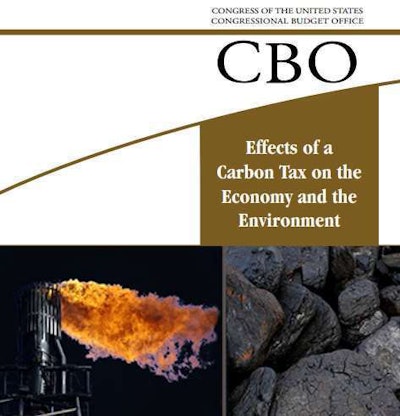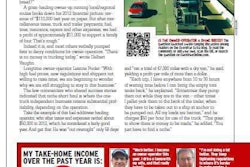 Click through the image to download and read the CBO’s 20-page report.
Click through the image to download and read the CBO’s 20-page report.Workers in “energy-intensive industries” such as truck transportation “would tend to experience comparatively large losses in income under a carbon tax because demand for their products [and services] would decline,” says a new analysis.
A bill proposing a tax on carbon dioxide emissions floated earlier this year in the United States Senate — opposed by most Republicans and some Democrats — was subsequently analyzed by the nonpartisan Congressional Budget Office. The analysis was requested by Rep. Henry Waxman (D-Calif.), the ranking member on the House Energy and Commerce Committee.
Depending on how the tax revenues are used, however, losses for energy-intensive industries could be offset in different ways. The report, which you can download here, primarily concerns itself with different scenarios for various carbon tax revenue uses and their potential impacts on the economy and federal budget:
1. If used to reduce the federal deficit solely, such a tax would initially harm the economy, increasing prices for consumers in a regressive fashion, with lower-income individuals affected disproportionately. It would, however, be effective in reducing federal budget deficits, which could hold positive outcomes for the economy long-term.

2. Used to reduced marginal tax rates for individual and business income in what the CBO calls a “tax swap,” however, the tax’s effect on economic output would be muted. “The net effect of a tax swap on output,” the report notes, “would depend on the relative sizes of the loss in output caused by the carbon tax itself (including both the primary costs and the tax-interaction costs) and the gain in output caused by the reduction in existing marginal tax rates.” Some analyses, the CBO notes, have concluded that “a tax swap could lead to a net increase in output” for the economy.
3. Distributing revenues to groups affected the most, the study found, would hold little utility for minimizing the broader economic impacts and could have the effect of actually incentivizing greater fossil-fuel use.
The CBO analysis also includes an effectiveness analysis relative to meeting the goals of a carbon tax — namely a reduction in emissions to prevent significant climate warming and potentially catastrophic outcomes.










